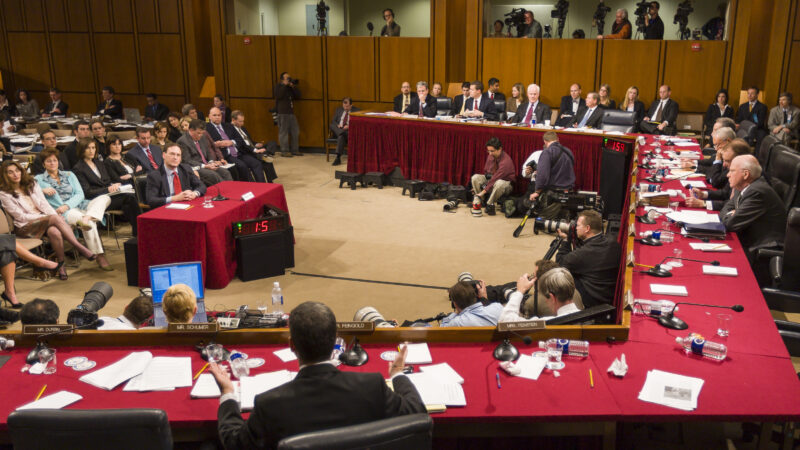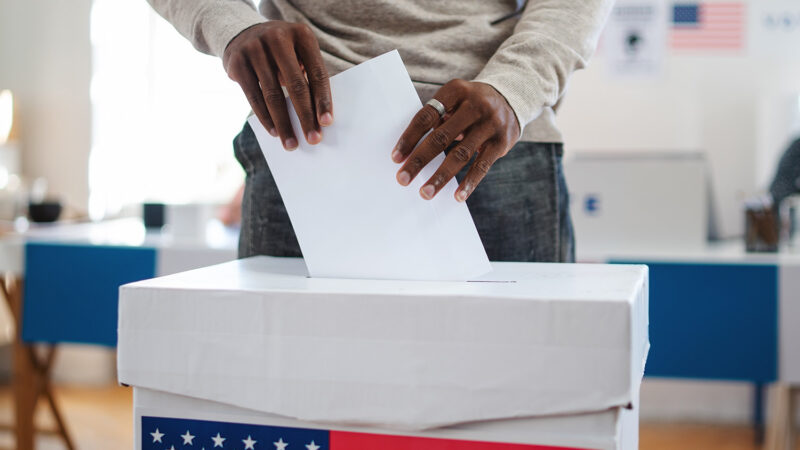Chris Crawford is a policy strategist at Protect Democracy. His work is focused on ensuring free and fair elections and the peaceful transfer of power, including staffing the National Task Force on Election Crises and managing the Faith in Elections Playbook in partnership with Interfaith America.
Frequently Asked Questions about the Electoral Count Act
- December 20, 2022

In December 2022, Congress passed the Electoral Count Reform Act (ECRA) as part of omnibus appropriations legislation. On this page, we have answers to frequently asked questions about reforming the ECA, and analysis of the newly enacted reforms.
What is the Electoral Count Act?
The Electoral Count Act of 1887 is the primary legal framework for the casting and counting of electoral votes for president and vice president in accordance with the Constitution. Congress enacted the ECA in 1887 following the contested presidential election of 1876, during which the lack of rules regulating Congress’s counting of electoral votes nearly caused a constitutional crisis. The ECA sets the timeline for states to appoint electors in November and transmit their votes to Congress in December. It also governs the process by which Congress counts electoral votes in January, including how it should resolve objections and related disputes.
Read more about the Electoral Count Act here.
Why was it critical for Congress to update the Electoral Count Act?Why was it critical for Congress to update the Electoral Count Act?
The last presidential election laid bare the weaknesses in the Electoral Count Act. The statute’s vague and arcane language made it susceptible to misunderstanding or worse — especially in future elections. By passing legislation well ahead of the 2024 election, Congress addressed the weaknesses in the ECA and protected future presidential elections and transitions, without helping or hindering any particular candidate or political party.
How does the Electoral Count Act prevent state legislatures from overriding theHow does the Electoral Count Act prevent state legislatures from overriding the will of the voters?
The Constitution allows states to decide how they will appoint presidential electors (i.e., through an election or other means), but Congress determines the day on which states must do so. Because all states hold popular elections, the day on which states must appoint their presidential electors is Election Day. The previous version of the ECA also included language that allowed state legislatures to determine the “manner” of appointing electors after Election Day if the state held an election on that day and “failed to make a choice.” But that phrase was antiquated and undefined, and some state (and federal) actors wrongly claimed it to mean that allegations of irregularities may be used to justify state legislatures questioning the results of the election and instead appointing electors themselves after the election, even if that means overriding the official results and the will of the voters.
The ECRA eliminates the concept of a failed election and makes clear that a state must appoint electors on Election Day, pursuant to existing law, unless a “force majeure” event that is “extraordinary and catastrophic” necessitates a modified voting period. Importantly, then, extended voting is the only permissible remedy under the statute.
How does the ECRA prevent members of Congress from rejecting lawfully certifiedHow does the ECRA prevent members of Congress from rejecting lawfully certified state election results?
Congress’ primary role under the Twelfth Amendment and the ECA is to count electoral votes — not to second-guess how states conducted their elections. But under the original ECA, it was relatively easy for members of Congress to object to a state’s certified election results because only a single member from each chamber is needed to raise an objection, and the appropriate grounds for objections are obscured by arcane language. The ECRA limits frivolous objections to electoral appointments or electoral votes by raising the threshold for members of Congress to make objections to one-fifth of each chamber and by clarifying the narrow grounds upon which such objections may be raised or sustained.
How does the ECRA prevent state officials from refusing to certify presidentialHow does the ECRA prevent state officials from refusing to certify presidential election results or certifying results that do not reflect the result of the popular vote?
Although Congress’ primary role in presidential elections is to count electoral votes, it should be able to ensure that the submissions it receives from the states are authentic, in that they reflect the actual outcome of those elections consistent with state and federal law. The ECRA includes a limited, expedited role for courts to intervene if, for example, state actors go “rogue” and purport to certify results that do not reflect the outcome of the election. And it allows members of Congress to object if a state purports to appoint electors in defiance of a court order.
What role should there be for the federal courts in an updated ECA?What role should there be for the federal courts in an updated Electoral Count Act?
The ECRA includes a provision for limited, expedited review by federal courts to address extreme situations in which state officials either fail to certify elections or purport to certify results that conflict with the outcome of the popular vote (and thus with state and federal law). The ECA requires an official from each state to send timely, accurate election results to Congress after the state completes its election and resolves any disputes as to the outcome. By creating a limited role for the federal courts to ensure that state officials perform this basic federal obligation in accordance with the law, the updated ECA also helps ensure that Congress keeps to its own limited role of counting electoral votes without second-guessing state election results.
Is the ECA constitutional?Is the Electoral Count Act constitutional?
Yes. Article II and Twelfth Amendment provide only a very basic timeline and framework for presidential elections, including setting out certain basic requirements for the appointment of electors, and providing that electoral votes must be opened by the President of the Senate in the presence of both chambers of Congress and then counted. The ECA does the necessary (and constitutionally sound) work of filling in the rest by explaining how electoral votes should be counted and how to resolve questions or disputes as to whether particular electoral votes are valid. For a more detailed explanation, read The Legitimate Role of Congress in the Electoral Count.
Does the Supreme Court’s independent state legislature case impact ECA reform?How does the Supreme Court’s consideration of the independent state legislature theory impact ECA reform?
On December 7, the Supreme Court heard Moore v. Harper, which includes arguments on the “independent state legislature” theory (ISL). ISL is a constitutional theory that would, if adopted, remove state-level checks on state legislatures’ regulation of federal elections, including freeing state legislatures from state constitutional constraints. If adopted by the Supreme Court, especially in its maximalist form, ISL could have disruptive and harmful effects on the administration of elections, leading to two different and potentially conflicting sets of rules for federal and state elections simultaneously. However, even if the most extreme version of ISL were to become law, state legislatures would still be required to comply with federal law, including the ECA.
Please contact Chris Crawford ([email protected]) for more information.
Related Content
Join Us.
Building a stronger, more resilient democracy is possible, but we can’t do it alone. Become part of the fight today.
Donate
Sign Up for Updates Sign Up for Updates
Explore Careers Explore Careers
How to Protect Democracy How to Protect Democracy




